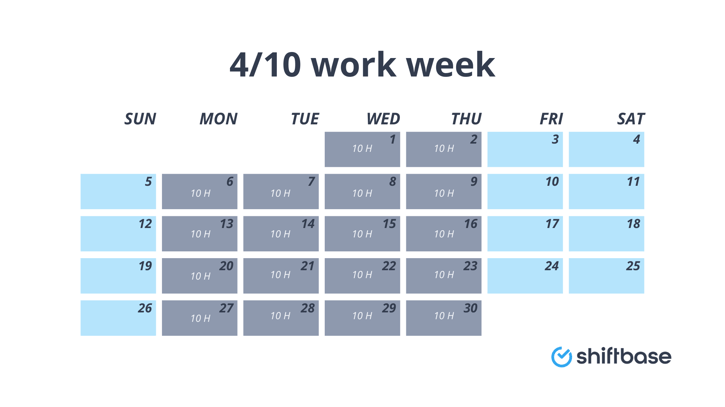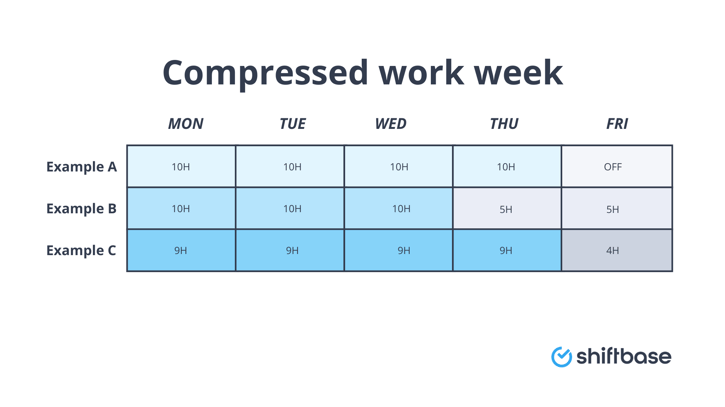The buzz around alternative work schedules is louder than ever, fuelled by compelling studies and bold case studies.
Yet, one concept stands out like a beacon, promising not just a better work-life balance, but a transformative shift in the workplace landscape: the 4-day workweek.
Imagine an office space buzzing with productive employees, where job satisfaction soars and the balance between work hours and personal time feels just right.
But what if this isn't just a pipe dream but a viable business model that's increasingly being experimented with across countries and industries?
Intrigued? Hold onto that three-day weekend feeling as we dive deep into this revolution that could redefine your work week, improve employee well-being, and potentially even save money on those mounting operating costs
The evolution of the 4-day workweek
The traditional five-day workweek, a standard since the early 20th century, is undergoing a significant transformation. The concept of a four-day workweek has gained momentum globally, driven by the pursuit of enhanced work-life balance, increased productivity, and improved employee well-being.
Global adoption and trials
-
United Kingdom: As of January 2025, over 200 UK companies, employing more than 5,000 individuals, have permanently adopted a four-day workweek without reducing salaries. This shift spans various sectors, including marketing, technology, and non-profit organisations.
-
Japan: In response to demographic challenges, Tokyo's government will implement a four-day workweek for its employees starting April 2025. This initiative aims to address the city's declining birthrate by offering employees more personal time.
-
Iceland: Between 2015 and 2019, Iceland conducted trials reducing the workweek to 35-36 hours without pay cuts. The results indicated improved employee well-being and maintained or increased productivity.
Impact on productivity and well-being
Studies have consistently shown that a reduced workweek can lead to significant benefits:
-
Increased Productivity: Microsoft Japan's trial of a four-day workweek resulted in a 40% boost in productivity.
-
Enhanced Employee Well-being: Research indicates that shorter workweeks contribute to better mental and physical health, increased life satisfaction, and reduced stress and burnout among employees.
Legislative developments
The movement towards a four-day workweek is also reflected in legislative actions:
-
United States: In 2023, U.S. Congress debated shortening the official workweek to four days, reflecting growing interest in flexible work arrangements.
-
Belgium: In 2022, Belgium introduced legislation allowing employees to request a four-day workweek by compressing their working hours, providing greater flexibility in work arrangements.
Current perspectives
The four-day workweek is gaining traction worldwide, with various countries and companies exploring its feasibility. While challenges remain, particularly in aligning this model with all industry types, the trend reflects a significant shift towards reimagining traditional work structures to prioritise employee well-being and productivity.
Incorporating these developments into your article will provide readers with a comprehensive understanding of the rise and current state of the four-day workweek, supported by recent statistics.
What countries have a 4 day work week?
The concept of a four-day workweek in the United States has gained significant attention, with various legislative efforts, company-led initiatives, and pilot programs exploring its feasibility and benefits.
Legislative efforts for US 4- day work week
-
Federal Level: In March 2024, Senator Bernie Sanders introduced the "Thirty-Two Hour Workweek Act," aiming to reduce the standard workweek from 40 to 32 hours without a reduction in pay. This legislation seeks to amend the Fair Labor Standards Act, requiring overtime pay for work exceeding 32 hours per week.
-
State Initiatives: Several states have proposed bills to encourage the adoption of a four-day workweek. In January 2023, Maryland legislators introduced the "Four-Day Workweek Act of 2023," designed to incentivise both private and public employers to trial a reduced workweek by offering tax credits. Although the proposal was initially withdrawn due to cost concerns, efforts to reintroduce similar legislation are ongoing.
Corporate adoption and pilot programs
A growing number of U.S. companies have experimented with or permanently implemented a four-day workweek. Notably, in 2022, 38 companies across the United States and Canada participated in a six-month pilot program coordinated by 4 Day Week Global. The program allowed employees to work one less day per week with no reduction in pay, aiming to assess impacts on productivity and employee well-being.
Companies with a 4-day work week
The United States has not officially adopted a four-day workweek at the federal or state level. However, several companies across the country have independently implemented or experimented with this model to enhance employee well-being and productivity.
| Company | Industry | Workweek Structure |
|---|---|---|
| Buffer | Social Media Management | 32-hour workweek over four days with full pay, implemented since 2020. |
| Elephant Ventures | Software Engineering | Four-day workweek with 10-hour days, transitioned from a trial to a permanent schedule. |
| Kickstarter | Crowdfunding Platform | Adopted a four-day workweek to improve employee well-being and productivity. |
| Wildbit | Software Development | Implemented a four-day workweek to enhance work-life balance and focus. |
| D’Youville College | Higher Education | Shifted staff and administrators to a four-day, 32-hour workweek without reducing pay or benefits. |
Europe 4-day work week
Various countries across Europe are exploring and implementing this model to enhance work-life balance, boost productivity, and improve employee well-being. The table below provides a snapshot of the diverse approaches European countries are taking toward implementing a four-day workweek, reflecting a broader trend toward enhancing work-life balance and productivity:
| Country | Status | Details |
|---|---|---|
| United Kingdom | Permanent Adoption | Over 200 companies employing more than 5,000 individuals have implemented a four-day workweek without salary reduction. |
| Belgium | Legislative Reform | Employees can opt to compress their workweek into four days, maintaining 38 hours, as per reforms introduced in February 2022. |
| Iceland | Widespread Implementation | Trials from 2015 to 2019 led to 86% of the workforce adopting reduced hours, effectively embracing a four-day workweek. |
| Germany | Cultural Shift | More than 150 companies have adopted a four-day week, with 71% of German companies favouring the model. |
| Spain | Government-Funded Trial | Launched a nationwide three-year trial of a 32-hour workweek to assess impacts on productivity and well-being. |
| France | Company-Level Adoption | While the standard workweek is 35 hours, approximately 10,000 workers have transitioned to a four-day schedule. |
| Lithuania | Targeted Legislation | Since 2023, public-sector employees with children under three can work 32 hours over four days without pay reduction. |
The advantages of a four-day workweek
Transitioning to a four-day workweek offers numerous benefits for both employers and employees. This model, which typically involves working 32 hours over four days without a reduction in pay, has been associated with increased productivity, improved employee well-being, and positive environmental impacts.
✅ Enhanced productivity
Contrary to concerns that reduced working hours might diminish output, several studies and real-world applications have demonstrated that a four-day workweek can boost productivity:
- Microsoft Japan's Trial: In 2019, Microsoft Japan implemented a four-day workweek, resulting in a 40% increase in productivity.
- Perpetual Guardian in New Zealand: The financial services firm conducted a trial where employees worked four days a week with no pay reduction. The outcome was a 20% rise in productivity, stable revenue, and decreased operational costs.
✅ Improved employee well-being
Reducing the workweek has been linked to better mental and physical health among employees:
- Reduced Burnout: A 2020 Gallup poll of over 10,000 workers found the lowest level of job burnout in employees who worked a four-day week.
- Work-Life Balance: Employees have reported that a four-day workweek makes it easier to balance work with personal responsibilities, leading to increased job satisfaction and overall well-being.
✅ Talent attraction and retention
Offering a four-day workweek can make organisations more attractive to top talent:
-
Competitive Advantage: Companies adopting this model have found it easier to attract and retain employees, as the additional day off is a significant incentive.
-
Employee Satisfaction: Organisations report that employees are more satisfied and motivated, leading to lower turnover rates.
✅ Environmental Benefits
A shorter workweek can contribute to environmental sustainability:
- Reduced Carbon Footprint: Fewer working days can lead to decreased commuting and lower energy consumption in office buildings, thereby reducing overall carbon emissions.
✅ Gender Equality
Implementing a four-day workweek can promote gender equality in the workplace:
- Shared Responsibilities: With an extra day off, both men and women can more equitably share household and caregiving duties, challenging traditional gender roles and supporting a more balanced distribution of domestic responsibilities.
Disadvantages of a 4-day work week
While the four-day workweek offers numerous benefits, it's essential to consider potential challenges that may arise with its implementation:
❌ Extended workdays
To maintain the standard 40-hour workweek within four days, employees may need to work 10-hour days. This extension can lead to increased fatigue and reduced productivity, as longer hours may diminish focus and efficiency.
❌ Customer service and coverage challenges
Businesses operating on a four-day schedule might face difficulties in providing consistent customer service, especially in industries requiring continuous client interaction. Reduced availability could lead to customer dissatisfaction and potential loss of business.
❌ Unsuitability for all industries
Certain sectors, such as healthcare, emergency services, and manufacturing, require round-the-clock operations. Implementing a four-day workweek in these fields could disrupt essential services and operational efficiency.
❌ Potential for increased stress
Condensing workloads into fewer days may result in heightened stress levels for employees, as they strive to complete the same amount of work in less time. This pressure can negate the intended benefits of a shorter workweek.
❌ Impact on salaries and benefits
Transitioning to a four-day workweek without adjusting workloads might lead to discussions about salary adjustments or changes in benefits, particularly if the total number of working hours is reduced. This could affect employee satisfaction and financial well-being.
4-day work week schedules examples
When contemplating a shift from the traditional five-day workweek, it's essential to consider the variety of four-day workweek schedules available.
Different structures offer unique pros and cons, which must be evaluated carefully. Here are some popular examples:
4x10 Schedule

Structure: Employees work four days a week for ten hours each day. Also known as the 4 on 3 off shift pattern schedule.
| Pros | Cons |
| Fewer Commutes: Employees save time and money on commuting. | Longer Days: Extended work hours can lead to fatigue. |
| Three-Day Weekends: A consistent three-day weekend can improve well-being | Limited Business Hours: Fewer days may mean a shorter customer service window. |
| Longer Hours for Projects: The extra hours can be beneficial for longer, uninterrupted tasks. |
Compressed Workweek

Structure: In the compressed work schedule, the total hours remain the same, but the work is compressed into fewer days.
| Pros | Cons |
| Same Amount of Work: No reduction in total hours ensures tasks are completed | Long Hours: Can be draining for employees. |
| Employee Morale: A longer weekend often boosts job satisfaction | Potential for Overtime: Any excess work spills into overtime pay. |
Rotating 4-Day Schedule
Structure: Employees take turns having a four-day week while others maintain a traditional schedule.
| Pros | Cons |
| Flexible Schedules: Accommodates various employee needs | Complexity: Requires robust time and attendance tracking, ideally through SaaS like Shiftbase |
| Customer Satisfaction: Business hours remain consistent | Inconsistency: The variable schedule may affect employee well-being negatively |
Alternate Week 4/5 Day Schedule
Structure: Employees work a four-day week followed by a five-day week.
| Pros | Cons |
| Work-Life Balance: Provides a taste of both work schedules | Inconsistent: May create difficulties in planning personal time |
| Adapting Business Hours: Easier adaptation to customer needs | Management Complexity: Requires strict hours registration to ensure compliance and fairness |
In summary, the structure you choose will depend on various factors, including employee well-being, business model, and customer satisfaction.
Some structures like the 4x10 may necessitate longer working hours, but they offer a consistent three-day weekend, which can be a boon for employee mental health.
Implementing a successful four-day work week will likely involve a trial period, during which the effectiveness of the chosen structure can be evaluated against key metrics.
How to implement a 4-day work week that actually works
If the traditional 5-day work week feels like an outdated model for your company, a four-day work week may be the change you need.
However, a successful transition involves more than simply cutting one day from the work week. Below are the steps and insights to help you make this change effectively.
👉 Embrace outcome-based work culture
Shifting to a four-day work week isn't merely about counting hours; it’s about redefining how you measure success.
- Focus on Outcomes, Not Hours: The success of a four-day work week relies on shifting from a time-focused model to an outcome-based model. The emphasis should be on what gets accomplished, not how long it takes to accomplish it.
- Set Clear Metrics: Ambiguity is the enemy of an outcome-based culture. Define specific goals and metrics to measure performance, and ensure that they align with the company's broader objectives.
- Foster Trust and Autonomy: An outcome-based model entrusts employees to complete their tasks without micromanagement. This empowers employees and fosters a sense of ownership.
👉 Equip managers for the change
Management's role becomes even more pivotal when introducing such a dramatic shift.
- Understand the Goals: Managers need to fully comprehend the outcome-based model. They must understand the metrics that matter and how to align their teams with these goals.
- Avoid Micromanagement: Trust your team to get the job done without hovering over them. Regular check-ins can be a part of one-to-one meetings, but the emphasis should be on progress, not control.
- Skills Assessment: Ensure that your team has the skills needed to achieve the outcomes you’ve set. This may require additional training or reallocation of responsibilities.
👉 Prioritise communication
Open and empathetic communication becomes more essential than ever.
- Lead with Empathy: Make an effort to understand what your employees need to thrive in this new arrangement. Recognise that personal life happens and be accommodating when it does.
- Be Available: Even though an outcome-based culture values autonomy, employees should feel they can approach management with issues or questions.
👉 Optimise yime management
With fewer working days, making the most of your time is crucial.
- Rethink Meetings: Meetings should add value, not just fill time. Consider implementing policies like shorter meetings or specific "no-meeting" days.
- Work Alone, Together: Foster collaborative environments where everyone works on the same problem but in their unique ways. This avoids groupthink and allows for more diverse solutions.
- End with Decisions: Meetings should conclude with a summary of what was decided, who is responsible for what, and what the next steps are.
👉 Consistent feedback loop
Continual improvement requires continual feedback.
- Regular Surveys: Deploy feedback surveys at various milestones. This will give you quantitative data on how well the new schedule is being received and where improvements can be made.
- Retrospectives: Conduct retrospective meetings at the end of each project or after a specific period has passed since the four-day work week's implementation. This gives everyone a chance to discuss what's working and what isn't.
By carefully planning your transition and putting these practices into action, a four-day work week can become a sustainable, productive, and rewarding way to work. Remember, the key to success is an outcome-based approach complemented by effective management, empathetic communication, and continuous feedback.
Cost-benefit analysis of a 4-day work week
Understanding the financial implications of a four-day work week is crucial for any HR manager or business owner contemplating this change. Let's delve into a detailed cost-benefit analysis to ascertain whether this alternative work schedule truly holds its weight in gold.
Operating costs
-
Electricity Costs: With one less day of office operations, companies can anticipate a reduction in utility bills.
-
Maintenance and Supplies: Fewer days at the office can mean less wear and tear on equipment, as well as savings on office supplies.
-
Overtime Pay: A well-structured four-day work week can reduce or eliminate the need for overtime, bringing down labor costs.
Benefits
-
Employee Productivity: Increased productivity often compensates for reduced operating hours. Employees working longer but fewer days can complete tasks more efficiently.
-
Employee Well-Being: A better work-life balance contributes to improved mental health and reduced stress, translating to fewer sick days and lower healthcare costs.
-
Retention: Reduced turnover saves on recruiting and training costs, providing a long-term financial benefit.


How Shiftbase can facilitate your transition to a 4-day work week schedule
As you consider the advantages of a 4-day work week, the logistics can be daunting: How will you manage employee scheduling, keep track of work hours with time tracking, or handle absence management? The solution is simpler than you might think: Shiftbase, a cutting-edge SaaS for workforce management.
Designed to streamline various aspects of employee management, Shiftbase offers you a seamless way to adapt to a shorter workweek without sacrificing efficiency or productivity. Ready to make the leap into the future of work? Start your free 14-day trial with Shiftbase today and experience firsthand how easy managing a 4-day work week can be.


